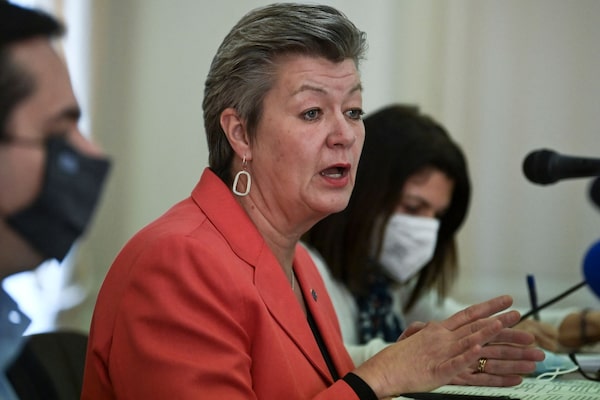
Ylva Johansson, the EU’s home affairs commissioner, speaks during a news conference in Mytilene, on the Greek island of Lesbos, on March 29, 2021.ARIS MESSINIS/AFP/Getty Images
Greece “can do more” to investigate reports it has pushed asylum-seekers back to Turkey, a senior European Union official said on Monday, as Greek authorities pledged a new migrant reception centre on the island of Lesbos would open in time for winter.
The United Nations refugee agency UNHCR has said it has received a growing number of reports in recent months suggesting asylum-seekers may have been pushed back to Turkey at sea or immediately after reaching Greek soil, or left adrift at sea.
Greek officials have always rejected the reports.
“I am very concerned about the UNHCR report and there are some specific cases that I really think need to be looked into closer,” Ylva Johansson, the EU’s home affairs commissioner, said during a visit to the island of Lesbos.
“I think the Greek authorities can do more when it comes to investigating these alleged pushbacks.”
Greece’s Migration Minister Notis Mitarachi, speaking at a news conference with Johansson, said Greece adhered to European and international law.
“We strongly deny that the Greek coast guard has ever been involved in pushbacks,” he said, adding that independent investigations, including by the Greek judiciary and by the EU’s border agency Frontex, had not found violations.
Greece and other front line states including Italy, Spain, Cyprus and Malta have called repeatedly for a more co-ordinated migration policy from the EU and more help from other EU countries in handling migrant arrivals.
Mitarachi said a new migrant reception centre on Lesbos to house thousands of migrants living in squalid conditions in a temporary site should be opened by the winter to replace the sprawling Moria camp that burned down last year.
Greece, and Lesbos in particular, was at the front line of Europe’s refugee crisis in 2015, with nearly a million people, mostly Syrians fleeing war, arriving by boat from Turkey.
Numbers have decreased dramatically since the EU struck a deal with Ankara a year later and just over 16,000 people arrived in Greece last year, according to UN data.
Mitarachi said about 14,000 migrants were currently in camps on five islands, down from about 42,000 in 2019. About 58,000 were in camps across Greece, down from 92,000 in 2019.
Our Morning Update and Evening Update newsletters are written by Globe editors, giving you a concise summary of the day’s most important headlines. Sign up today.